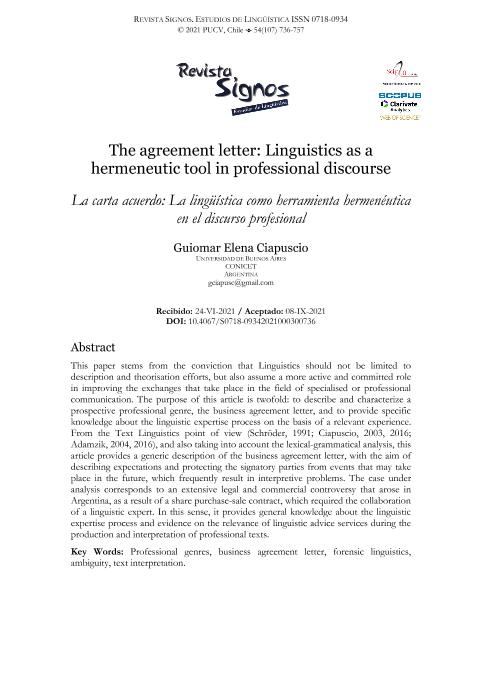Mostrar el registro sencillo del ítem
dc.contributor.author
Ciapuscio, Guiomar Elena

dc.date.available
2022-08-26T19:01:16Z
dc.date.issued
2021-12
dc.identifier.citation
Ciapuscio, Guiomar Elena; The agreement letter: Linguistics as a hermeneutic tool in professional discourse; Pontificia Universidad Católica de Valparaíso. Instituto de Literatura y Ciencias del Lenguaje; Signos; 54; 107; 12-2021; 736-757
dc.identifier.issn
0035-0451
dc.identifier.uri
http://hdl.handle.net/11336/166723
dc.description.abstract
This paper stems from the conviction that Linguistics should not be limited to description and theorisation efforts, but also assume a more active and committed role in improving the exchanges that take place in the field of specialised or professional communication. The purpose of this article is twofold: to describe and characterize a prospective professional genre, the business agreement letter, and to provide specific knowledge about the linguistic expertise process on the basis of a relevant experience. From the Text Linguistics point of view (Schröder, 1991; Adamzik, 2004, 2016; Autor, 2003, 2016), and also taking into account the lexical-grammatical analysis, this article provides a generic description of the business agreement letter, with the aim of describing expectations and protecting the signatory parties from events that may take place in the future, which frequently result in interpretive problems. The case under analysis corresponds to an extensive legal and commercial controversy that arose in Argentina, as a result of a share purchase-sale contract, which required the collaboration of a linguistic expert. In this sense, it provides general knowledge about the linguistic expertise process and evidence on the relevance of linguistic advice services during the production and interpretation of professional texts.
dc.description.abstract
Este trabajo parte de la convicción de que la lingüística no debe limitarse a describir y teorizar, sino que tiene que asumir un papel más activo y comprometido en la optimización de los intercambios que ocurren en el marco de la comunicación especializada o profesional. El artículo se propone alcanzar un doble propósito: describir y caracterizar un género profesional prospectivo —la carta acuerdo comercial— y aportar conocimiento específico acerca del proceso de peritaje lingüístico, a partir de una experiencia significativa. Desde la perspectiva de la lingüística del texto (Schröder 1991; Ciapuscio, 2003, 2016; Adamzik, 2004, 2016) y con el auxilio del análisis léxicogramatical, se ofrece una caracterización genérica de la carta-acuerdo comercial, cuya finalidad es describir expectativas y proteger a las partes firmantes de hechos que podrían ocurrir en el futuro, y que frecuentemente dan lugar a conflictos de interpretación. El caso estudiado corresponde a una extensa controversia legal y comercial suscitada en Argentina, a raíz de un contrato de compra-venta de acciones, que demandó la colaboración de una perita lingüística. En este sentido, el artículo aporta conocimiento general sobre el proceso de peritaje lingüístico y provee evidencia sobre la relevancia del asesoramiento lingüístico en la producción e interpretación de textos profesionales.
dc.format
application/pdf
dc.language.iso
eng
dc.publisher
Pontificia Universidad Católica de Valparaíso. Instituto de Literatura y Ciencias del Lenguaje
dc.rights
info:eu-repo/semantics/openAccess
dc.rights.uri
https://creativecommons.org/licenses/by/2.5/ar/
dc.subject
AMBIGUITY
dc.subject
BUSINESS AGREEMENT LETTER
dc.subject
FORENSIC LINGUISTICS
dc.subject
PROFESSIONAL GENRES
dc.subject
TEXT INTERPRETATION
dc.subject.classification
Lingüística

dc.subject.classification
Lengua y Literatura

dc.subject.classification
HUMANIDADES

dc.title
The agreement letter: Linguistics as a hermeneutic tool in professional discourse
dc.title
La carta acuerdo: La lingüística como herramienta hermenéutica en el discurso profesional
dc.type
info:eu-repo/semantics/article
dc.type
info:ar-repo/semantics/artículo
dc.type
info:eu-repo/semantics/publishedVersion
dc.date.updated
2022-08-25T13:52:59Z
dc.identifier.eissn
0718-0934
dc.journal.volume
54
dc.journal.number
107
dc.journal.pagination
736-757
dc.journal.pais
Chile

dc.journal.ciudad
Valparaíso
dc.description.fil
Fil: Ciapuscio, Guiomar Elena. Consejo Nacional de Investigaciones Científicas y Técnicas; Argentina. Universidad de Buenos Aires; Argentina
dc.journal.title
Signos
dc.relation.alternativeid
info:eu-repo/semantics/altIdentifier/url/http://plataformaeditorial.revistasignos.cl/index.php/signos/article/view/806
dc.relation.alternativeid
info:eu-repo/semantics/altIdentifier/doi/http://dx.doi.org/10.4067/S0718-09342021000300736
dc.relation.alternativeid
info:eu-repo/semantics/altIdentifier/url/https://www.scielo.cl/scielo.php?script=sci_arttext&pid=S0718-09342021000300736&lng=en&nrm=iso&tlng=en
Archivos asociados
